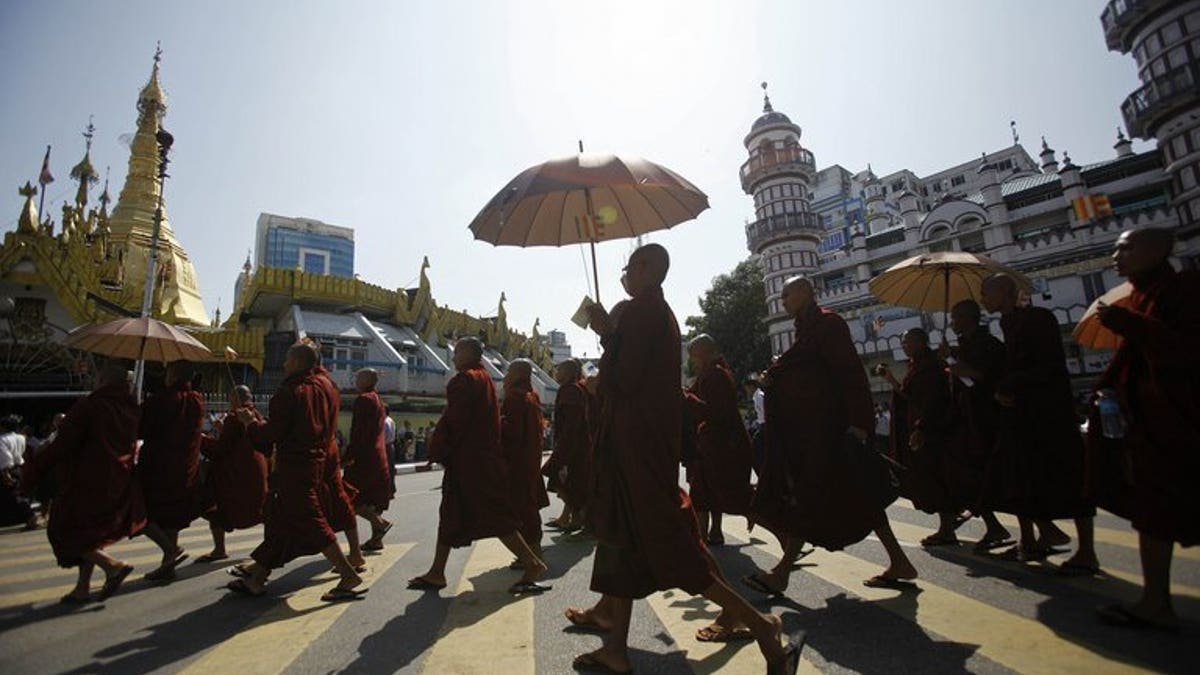
Myanmar Buddhist monks take part in a demonstration against the Organisation of the Islamic Conference in Yangon on October 15, 2012. A small blast near an event hosted by a radical Myanmar monk who stands accused of inflaming Buddhist-Muslim tensions has left five people injured in Mandalay, police said Monday. (AFP/File)
YANGON, Yangon division (AFP) – A small blast near an event hosted by a radical Myanmar monk who stands accused of inflaming Buddhist-Muslim tensions has left five people injured in Mandalay, police said Monday.
"The scene was about 100 yards (90 metres) away from the preaching event," said an officer from police headquarters in the capital Naypyidaw who asked not to be named.
Police said five people -- a Buddhist child novice monk, three women and one man -- were slightly injured in the blast, which occurred in a residential area of Myanmar's second largest city on Sunday evening.
"We do not know the cause of the blast yet and are still investigating. But we think it could be from a homemade device," the officer told AFP.
He added that a vehicle where the blast was thought to have originated was slightly damaged.
The cleric, Wirathu, confirmed the incident and blamed "the minority" linked to an article in Time magazine, which highlighted his anti-Muslim sermons as a key factor in inciting a wave of deadly religious violence this year.
Attacks against Muslims -- who make up an estimated four percent of Myanmar's population -- have exposed deep fractures in the Buddhist-majority nation and cast a shadow over its emergence from army rule.
Myanmar in June banned the controversial Time magazine cover story on Buddhist-Muslim unrest, which featured a picture of Wirathu and the caption 'The Face of Buddhist Terror'.
The article, one of a host of stories by the international media that have caused consternation in Myanmar, was met with anger on social media sites and its author, Time East Asia Correspondent Hannah Beech, has been singled out for personal criticism.
In an article on his Facebook page entitled "This is the beginning of the cultural acts of the minority loved by Hannah Beech", Wirathu said the blast had injured audience members.
The monk has been the focus of scrutiny after emerging at the forefront of a nationalistic group calling for the boycott of Muslim businesses by Buddhists. He has recently campaigned for restrictions on marriages between Buddhist women and men from other faiths.
In March at least 44 people were killed in sectarian strife in central Myanmar, with thousands of people left homeless after Buddhist mobs set whole Muslim neighbourhoods ablaze.
In one area alone, at least 20 pupils and four teachers from a Muslim madrassa were murdered, according to witnesses and rights groups.
Myanmar on Saturday lifted a state of emergency imposed in the riot-hit town "as peace and stability has already been restored", according to a notice in the state-backed New Light of Myanmar newspaper.
Communal unrest last year in the western state of Rakhine left about 200 people dead and up to 140,000 displaced, mainly Rohingya Muslims.
Some robed monks have taken part in the clashes.
Reformist President Thein Sein on Friday denied accusations by Human Rights Watch of ethnic cleansing against Rohingya Muslims.
The Myanmar leader said the claims were part of a "smear campaign" against his government in an interview with France 24 television towards the end of a European tour that took him to London and Paris.
Thein Sein met Myanmar religious organisations and the country's human rights commission in Yangon on Sunday in an effort to "build trust" between faith groups, presidential spokesman Ye Htut said.
"We will take action to anyone who incites communal conflict," he told reporters Sunday, but declined to comment on Wirathu's group specifically.




















